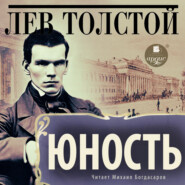По всем вопросам обращайтесь на: info@litportal.ru
(©) 2003-2025.
✖
Sevastopol
Настройки чтения
Размер шрифта
Высота строк
Поля
Vlang, who appeared to be asleep, suddenly raised his head, and seized Volodya by the skirt of his coat.
“Come, don't go! how can you!” he began, in a tearfully imploring tone. “You don't know about things yet; they are firing at us out there all the time; it is better here.”
But, in spite of Vlang's entreaties, Volodya made his way out of the bomb-proof, and seated himself on the threshold, where Melnikoff was already sitting.
The air was pure and fresh, particularly after the bomb-proof – the night was clear and still. Through the roar of the discharges could be heard the sounds of cart-wheels, bringing gabions, and the voices of the men who were at work on the magazine. Above their heads was the lofty, starry sky, across which flashed the fiery streaks caused by the bombs; an arshin away, on the left, a tiny opening led to another bomb-proof, through which the feet and backs of the soldiers who lived there were visible, and through which their voices were audible; in front, the elevation produced by the powder-vault could be seen, and athwart it flitted the bent figures of men, and upon it, at the very summit, amid the bullets and the bombs which whistled past the spot incessantly, stood a tall form in a black paletot, with his hands in his pockets, and feet treading down the earth, which other men were fetching in sacks. Often a bomb would fly over, and burst close to the cave. The soldiers engaged in bringing the earth bent over and ran aside; but the black figure never moved; went on quietly stamping down the dirt with his feet, and remained on the spot in the same attitude as before.
“Who is that black man?” inquired Volodya of Melnikoff.
“I don't know; I will go and see.”
“Don't go! it is not necessary.”
But Melnikoff, without heeding him, walked up to the black figure, and stood beside him for a tolerably long time, as calm and immovable as the man himself.
“That is the man who has charge of the magazine, Your Honor!” he said, on his return. “It has been pierced by a bomb, so the infantry-men are fetching more earth.”
Now and then, a bomb seemed to fly straight at the door of the bomb-proof. On such occasions, Volodya shrank into the corner, and then peered forth again, gazing upwards, to see whether another was not coming from some direction. Although Vlang, from the interior of the bomb-proof, repeatedly besought Volodya to come back, the latter sat on the threshold for three hours, and experienced a sort of satisfaction in thus tempting fate and in watching the flight of the bombs. Towards the end of the evening, he had learned from what point most of the firing proceeded, and where the shots struck.
XXII
On the following day, the 27th, after a ten-hours sleep, Volodya, fresh and active, stepped out on the threshold of the casement; Vlang also started to crawl out with him, but, at the first sound of a bullet, he flung himself backwards through the opening of the bomb-proof, bumping his head as he did so, amid the general merriment of the soldiers, the majority of whom had also come out into the open air. Vlang, the old gun-sergeant, and a few others were the only ones who rarely went out into the trenches; it was impossible to restrain the rest; they all scattered about in the fresh morning air, escaping from the fetid air of the bomb-proof, and, in spite of the fact that the bombardment was as vigorous as on the preceding evening, they disposed themselves around the door, and some even on the breastworks. Melnikoff had been strolling about among the batteries since daybreak, and staring up with perfect coolness.
Near the entrance sat two old soldiers and one young, curly-haired fellow, a Jew, who had been detailed from the infantry. This soldier picked up one of the bullets which were lying about, and, having smoothed it against a stone with a potsherd, with his knife he carved from it a cross, after the style of the order of St. George; the others looked on at his work as they talked. The cross really turned out to be quite handsome.
“Now, if we stay here much longer,” said one of them, “then, when peace is made, the time of service will be up for all of us.”
“Nothing of the sort; I have at least four years service yet before my time is up, and I have been in Sevastopol these five months.”
“It is not counted towards the discharge, do you understand,” said another.
At that moment, a cannon-ball shrieked over the heads of the speakers, and struck only an arshin away from Melnikoff, who was approaching them from the trenches.
“That came near killing Melnikoff,” said one man.
“I shall not be killed,” said Melnikoff.
“Here's the cross for you, for your bravery,” said the young soldier, who had made the cross, handing it to Melnikoff.
“No, brother, a month here counts for a year, of course – that was the order,” the conversation continued.
“Think what you please, but when peace is declared, there will be an imperial review at Orshava, and if we don't get our discharge, we shall be allowed to go on indefinite leave.”
At that moment, a shrieking little bullet flew past the speakers' heads, and struck a stone.
“You'll get a full discharge before evening – see if you don't,” said one of the soldiers.
They all laughed.
Not only before evening, but before the expiration of two hours, two of them received their full discharge, and five were wounded; but the rest jested on as before.
By morning, the two mortars had actually been brought into such a condition that it was possible to fire them. At ten o'clock, in accordance with the orders which he had received from the commander of the bastion, Volodya called out his command, and marched to the battery with it.
In the men, as soon as they proceeded to action, there was not a drop of that sentiment of fear perceptible which had been expressed on the preceding evening. Vlang alone could not control himself; he dodged and ducked just as before, and Vasin lost some of his composure, and fussed and fidgeted and changed his place incessantly.
But Volodya was in an extraordinary state of enthusiasm; the thought of danger did not even occur to him. Delight that he was fulfilling his duty, that he was not only not a coward, but even a valiant fellow, the feeling that he was in command, and the presence of twenty men, who, as he was aware, were surveying him with curiosity, made a thoroughly brave man of him. He was even vain of his valor, put on airs before his soldiers, climbed up on the banquette, and unbuttoned his coat expressly that he might render himself the more distinctly visible.
The commander of the bastion, who was going the rounds of his establishment as he expressed it, at the moment, accustomed as he had become during his eight-months experience to all sorts of bravery, could not refrain from admiring this handsome lad, in the unbuttoned coat, beneath which a red shirt was visible, encircling his soft white neck, with his animated face and eyes, as he clapped his hands and shouted: “First! Second!” and ran gayly along the ramparts, in order to see where his bomb would fall.
At half-past eleven the firing ceased on both sides, and at precisely twelve o'clock the storming of the Malakoff mound, of the second, third, and fifth bastions began.
XXIII
On this side of the bay, between Inkerman and the northern fortifications, on the telegraph hill, about midday, stood two naval men; one was an officer, who was engaged in observing Sevastopol through a telescope, and the other had just arrived at the signal-station with his orderly.
The sun stood high and brilliant above the bay, and played with the ships which floated upon it, and with the moving sails and boats, with a warm and cheerful glow. The light breeze hardly moved the leaves of the dry oak-shrubs which stood about the signal-pole, puffed out the sails of the boats, and ruffled the waves.
Sevastopol, with her unfinished church, her columns, her line of shore, her boulevard showing green against the hill, and her elegant library building, with her tiny azure inlets, filled with masts, with the picturesque arches of her aqueducts, and the clouds of blue smoke, lighted up now and then by red flashes of flame from the firing; the same beautiful, proud, festive Sevastopol, hemmed in on one side by yellow, smoke-crowned hills, on the other by the bright blue sea, which glittered in the sun, was visible the same as ever, on the other side of the bay.
Over the horizon-line of the sea, along which floated a long wreath of black smoke from some steamer, crept long white clouds, portending a gale. Along the entire line of the fortifications, especially over the hills on the left, rose columns of thick, dense, white smoke; suddenly, abruptly, and incessantly illuminated by flashes, lightnings, which shone even amid the light of high noon, and which constantly increased in volume, assuming divers forms, as they swept upwards, and tinged the heavens. These puffs of smoke flashing now here, now there, took their birth on the hills, in the batteries of the enemy, in the city, and high against the sky. The sound of the discharges never ceased, but shook the air with their mingled roar.
At twelve o'clock, the puffs of smoke began to occur less and less frequently, and the atmosphere quivered less with the roar.
“But the second bastion is no longer replying at all,” said the officer of hussars, who sat there on horseback; “it is utterly destroyed! Horrible!”
“Yes, and the Malakoff only sends one shot to their three,” replied the officer who was looking through his glass. “It enrages me to have them silent. They are firing straight on the Kornilovsky battery, and it is not answering at all.”
“But you see that they always cease the bombardment at twelve o'clock, just as I said. It is the same to-day. Let us go and get some breakfast … they are already waiting for us … there's nothing to see.”
“Stop, don't interfere,” said the officer with the glass, gazing at Sevastopol with peculiar eagerness.
“What's going on there? What is it?”
“There is a movement in the trenches, and heavy columns are marching.”
“Yes, that is evident,” said the other. “The columns are under way. We must give the signal.”
“See, see! They have emerged from the trenches.”
In truth, it was visible to the naked eye that dark masses were moving down the hill, across the narrow valley, from the French batteries to the bastions. In front of these specks, dark streaks were visible, which were already close to our lines. White puffs of smoke of discharges burst out at various points on the bastions, as though the firing were running along the line.
The breeze bore to them the sounds of musketry-shots, exchanged briskly, like rain upon the window-pane. The black streaks moved on, nearer and nearer, into the very smoke. The sounds of firing grew louder and louder, and mingled in a lengthened, resounding roar.
The smoke, rising more and more frequently, spread rapidly along the line, flowed together in one lilac-hued cloud, which dispersed and joined again, and through which, here and there, flitted flames and black points – and all sounds were commingled in one reverberating crash.
“An assault,” said the officer, with a pale face, as he handed the glass to the naval officer.
Orderlies galloped along the road, officers on horseback, the commander-in-chief in a calash, and his suite passed by. Profound emotion and expectation were visible on all countenances.

















